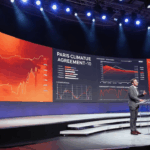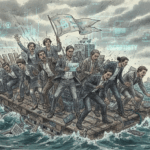Ksapa attended an event “Responsible Business in Uncertain Times: Strengthening Corporate Leadership amidst Global Conflicts”, held by IHRB at the International Committee of the Red Cross in Geneva. Event focused on the role of businesses in addressing human rights during global conflicts. Key sessions explored how businesses can responsibly navigate the challenges posed by conflicts, such as violence, displacement, and environmental devastation. Discussions emphasized how businesses can contribute to conflict resolution and peacebuilding by collaborating with civil society and adopting sustainable practices. Panels covered diverse topics, such as the role of commodities in conflict-free supply chains, the financial sector’s influence on conflicts, and technology’s dual role in both mitigating and exacerbating conflict. The event also examined issues the like critical minerals’ supply chains and the effectiveness of initiatives like the OECD Guidelines on Conflict Minerals. It also delved into the global financial system’s role in funding wars and post-conflict reconstruction, and the impact of technology in modern warfare and surveillance. The day concluded with reflections on the importance of corporate responsibility in fragile times and called for stronger regulations to adapt to new geopolitical realities. Our key takeaways.
What Drives Uncertain Economic Times These Days?
Key Systemic Drivers
Uncertain economic times today are driven by a complex interplay of global and domestic factors. Key drivers include inflation, geopolitical tensions, and shifts in monetary policy. Inflation, fueled by supply chain disruptions from the COVID-19 pandemic, rising energy costs, and labor shortages, has led to increased costs of goods and services. Central banks, particularly the U.S. Federal Reserve, have responded with aggressive interest rate hikes, aiming to curb inflation but creating fears of slowing economic growth or recession.
Geopolitical tensions, notably the war in Ukraine or Gaza and Lebanon region, or Taiwan area among many others, and trade disputes between major economies like the U.S. and China, add to uncertainty. The war has disrupted global energy and food supplies, pushing prices higher and creating risks for global markets. Additionally, shifting economic power dynamics between China and Western economies compounded by decoupling in critical sectors like technology, increase trade risks and market volatility.
Technological changes and climate risks also contribute to economic uncertainty. Automation, artificial intelligence, and green energy transitions are transforming industries, labor markets, and investment strategies, while environmental challenges, such as extreme weather events, threaten long-term economic stability.
Finally, public debt levels in many countries, built up during the pandemic, are straining government budgets, limiting their ability to stimulate economies during downturns. This convergence of inflation, geopolitical instability, technological disruption, and policy responses creates an unpredictable economic landscape for businesses and consumers alike.
What’s Really “Uncertain” here? The Value of Proactive Human Rights Due Diligence
One of the most interesting lessons to be learned from these discussions is the question of unpredictability. In fact, we’d like to believe that geopolitical, health or environmental turbulence is ushering in a new world of uncertainty. Were the wars in the Middle East and Ukraine not foreseeable? Would a war over Taiwan really come as a surprise? Wasn’t a health crisis like covid foreseeable? The impacts of climate change, identified 100 years ago and documented with ever greater precision over the past 30 years, were not foreseeable?
The context is increasingly volatile, with unpredictable consequences. There’s no denying it. But the reasons for this volatile context are largely predictable, documented and even datable. This makes human rights due diligence all the more critical. Understanding territories, engaging the most vulnerable socio-economic players in these territories, constantly making the link between human rights risks and their impact on society. All this makes all the more sense in a volatile and deteriorating context of conflict prevention.
What’s Role of Business Respecting Human Rights in Economic Uncertain Times?
In uncertain economic times, businesses respecting human rights play a crucial role in fostering resilience, stability, and trust—both for themselves and the broader economy. Prioritizing human rights is not only an ethical responsibility but also a strategic decision that can enhance long-term sustainability.
1. Building Trust: Businesses that uphold human rights, such as fair labor practices and non-discriminatory policies, tend to cultivate stronger relationships with consumers, employees, and investors. In volatile economic climates, trust is a valuable asset. Companies known for conducting human right due diligences, learning from failures, sharing how they develop corrective measures improving processes are more likely to retain customer loyalty, avoid complicity of staff with human right abuses, and attract socially-conscious investors, even when the market is uncertain.
2. Employee Retention and Productivity: Respecting workers’ rights, such as safe working conditions, fair wages, and freedom from exploitation, directly affects employee morale and productivity. In times of economic uncertainty, a motivated and secure workforce can drive innovation and efficiency, giving businesses a competitive edge. Conversely, neglecting human rights can lead to costly strikes, high turnover, and reputational damage.
3. Risk Management: Companies that prioritize human rights are better positioned to navigate regulatory risks. As governments respond to social pressures, stricter regulations on labor, supply chains, and environmental practices often emerge. Firms with strong human rights practices are more adaptable to these changes, avoiding legal penalties and potential market boycotts.
In essence, respecting human rights during economic uncertainty helps businesses mitigate risks, ensure stability, and contribute to a more just and resilient economic environment.
How Companies can Better Ensure Local Uptake of Human Rights Across Their Operations?
To ensure the local uptake of human rights across their operations, companies need to implement a proactive, structured approach that integrates human rights principles into every aspect of their business. Here are key strategies to achieve this:
1. Human Rights Policies and Due Diligence
Companies should develop clear, robust human rights policies that align with international standards like the UN Guiding Principles on Business and Human Rights. These policies must be communicated across all levels of the organization, including local subsidiaries and supply chains. Conducting thorough due diligence to identify, prevent, and mitigate human rights risks in all local contexts is crucial.
Companies invest too much on traceability or certification schemes which are not necessarily proving to help identifying and mitigating risks. Time to complement such “top down” efforts with territorial approaches where companies know overall they are doing business or their operations are involved somehow in transactions. That includes engaging local staff to train on how to identify and mitigate concrete human right related risks in how they operate, support concrete and effective engagement of local stakeholders, manage dilemma including disinvestment decisions.
2. Local Engagement and Stakeholder Consultation
Engaging with local communities, workers, and stakeholders ensures that human rights initiatives are contextually relevant. Companies should involve local civil society groups, labor unions, and human rights organizations to understand local challenges and adapt their policies accordingly. This participatory approach fosters trust and empowers the local population.
Many “Western” regulations (e.g.: CSRD, EUDR, CS3D…) are conducive to encourage investors and companies alike to take human rights more seriously in how they operate. At the same, they all are framed to serve interests of Western stakeholders mostly framed ultimately in terms of data collection ensuring to protect export activities somehow. What’s in for host countries is critical to build alignment on the critical importance addressing and working on potential issues. This connects overall to questions often related to poverty alleviation, increase of revenues in host economies, access to education of workers or smallholders.
3. Training and Capacity Building
Training local managers, employees, and suppliers on human rights principles and practices ensures that these standards are consistently applied. Regular workshops, local language materials, and hands-on support can help bridge knowledge gaps and create a shared understanding of human rights responsibilities.
Regulations – starting with CSRD – now generate compliance questions across value chains. Training is a starting point, but not an end. Question for companies increasingly is about proving impact of training on how staff operates, manages issues, and document how risks are better mitigated, and how glitches in processes or behaviors are increasingly corrected.
4. Monitoring and Accountability Mechanisms
Establishing local monitoring systems, such as regular audits, grievance mechanisms, and third-party assessments, ensures accountability. Local feedback loops allow workers and communities to report violations anonymously, encouraging transparency and addressing issues early. Companies sometimes invest in worker voice systems. That’s a starting point but by no means a one size fit all solution. How to involve communities? How to circumvent ineffective social media platform unable to contextualize, moderate and translate content effectively despite years of grievances and scandals in the space across multiple geographies and contexts?
5. Cultural Sensitivity and Adaptation
Human rights implementation should respect local cultures while promoting universal values. Companies need to adapt their strategies to fit local customs without compromising on human rights, creating inclusive workplaces and ensuring fair treatment in diverse environments. By embedding human rights across their local operations through these steps, companies can foster ethical practices and contribute to sustainable development in the regions where they operate.
Conclusion
Technologies, finance and commodities all shape together an interconnected system of economic value chains at the core of potential human right related risks magnified in the context of uncertain times. Discussions regularly debated and showed poor alignment between the concepts of geopolitical risks and conflict zones. A way to remain vague about which zone can require particular and specific approach beyond generic and broad human right approach.
Using the geopolitical risk lens can be a way to keep the focus consensual. But also a way to keep the analysis too short to really identify where actual risks generated by our uncertain times may occur. A conflict zone is an area where armed conflict, such as war or violent clashes, is actively taking place. It typically involves military operations, insurgencies, or civil unrest, putting civilians, infrastructure, and security at significant risk due to violence, instability, and lack of effective governance. Wherever this definition can apply – no matter whether domestic or triggered by geopolitical dynamics, then the area considered shall trigger a human right process adapted to the specific risk profile of such conflictual areas. Working differently is just misleading and a way for companies and investors to remain blind at risk to be complicit of human right abuses.
All in all, investors, buyers and companies operating along the value chains in technologies, financial services and agricultural or mineral commodity supply chains doubtless have to adopt the concept of “conflict zone”, and develop a specific process to proactively activate wherever transactions occur in a zone eligible to the definition.
Image by creativeart on Freepik
Président et Cofondateur. Auteur de différents ouvrages sur les questions de RSE et développement durable. Expert international reconnu, Farid Baddache travaille à l’intégration des questions de droits de l’Homme et de climat comme leviers de résilience et de compétitivité des entreprises. Restez connectés avec Farid Baddache sur Twitter @Fbaddache.












